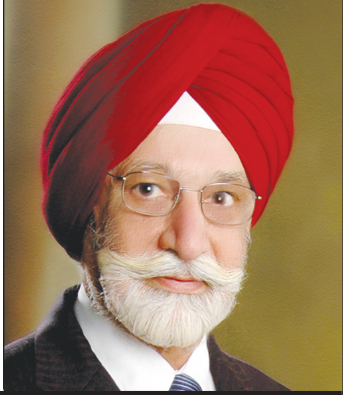Vital importance of capacity building
In its recommendations the Kasturirangan Committee identified faculty capacity building as a critical prerequisite of improving HEIs. But NEP 2020 makes only a passing reference to it – Dr. R.S. Grewal
THE NEW NATIONAL EDUCATION POLICY (NEP) 2020 was presented to the country and public on July 29 last ye ar. But as was the case with NEP 1968 and NEP-1986, progress in implementing it is very slow. NEP 2020 is substantially the outcome of the 484-page report of the K. Kasturirangan Committee presented to the Union HRD (now education) ministry on December 15, 2018. In its recommendations for higher education the KR committee had identified faculty capacity building as a critical prerequisite of strengthening and improving HEIs (higher education institutions).
ar. But as was the case with NEP 1968 and NEP-1986, progress in implementing it is very slow. NEP 2020 is substantially the outcome of the 484-page report of the K. Kasturirangan Committee presented to the Union HRD (now education) ministry on December 15, 2018. In its recommendations for higher education the KR committee had identified faculty capacity building as a critical prerequisite of strengthening and improving HEIs (higher education institutions).
Regrettably, apart from generic platitudes, NEP 2020 makes only a passing reference to faculty capacity building in the country’s also-ran HEIs, none of whom are ranked among the global Top 200 in the authoritative WUR (World University Rankings) of the highly-respected HEIs assessment and ranking agencies QS and Times Higher Education. Although it’s universally accepted that high-quality faculty is critical for excellence in teaching-learning and research, NEP 2020 contains no constructive solutions — let alone a roadmap — for faculty capacity building in India’s 55,000 colleges and almost 1,100 universities.
Unfortunately, for the past several decades, the brightest graduates and postgrads seldom opted to enter the teaching profession. That’s because instead of valuing teachers as national assets, schools and HEIs tend to treat them as mere employees. Not only are teachers and professors modestly remunerated, they are accorded low status in Indian society. There was a time in our country when kings rose from their thrones to welcome learned teachers who were venerated as fonts and disseminators of wisdom. But today they are tolerated, rather than respected in Indian society.
A major share of the blame for this unsatisfactory situation has to be laid at the collective door of teachers themselves. Their mindsets and pedagogies are of the 1930s. The academic community, and this includes assistant professors, associate professors and professors in HEIs, is nowhere near as competent — especially in the area of original and innovative research — as their counterparts in top-ranked Western universities. Worse, they seem quite satisfied with the status quo and show little interest and inclination for self-improvement. Therefore training and professional development of 1.45 million highered faculty is a major challenge facing contemporary India. Sustained neglect of formal teacher training and professional development now demands special measures for capacity building comprising motivation and coercion. Self evidently, remuneration and service conditions of faculty in HEIs need to be overhauled to attract academic toppers with idealism and positive value-premises to teach in the country’s colleges and universities. The precondition of this is that government and the middle class must shed the notion that high-quality education can be availed at low price.
HEIs can increase the remuneration of faculty only if they are allowed to charge realistic fees from students. College and university fees have been frozen for decades and are totally disconnected with the cost of education provision. Admittedly, meritorious youth from socio-economically disadvantaged households should not be shut out of higher education because of their financial circumstances. Therefore options such as targeted, means-tested scholar[1]ships and long-term soft loans need to be offered to ensure accessibility.
Moreover, although it’s expensive, there is the option of HEIs recruiting foreign mentor professors to train faculty. In the immediate years after independence, industrialist-philanthropist G.D. Birla invited faculty from the Massachusetts Institute of Technology, USA to train and mentor faculty of BITS-Pilani during its formative years. As a result, graduates of BITS-Pilani are readily welcomed into respected corporates in India and abroad. Satya Nadella, incumbent CEO of Microsoft Inc, is a BITS-Pilani alumnus.
Developing the abundant and high-potential human capital of the youngest national population worldwide, requires skilled teachers and academics with domain and general knowledge who can teach by innovating through creative classrooms. This requires effective use of contemporary digital technologies and learning management systems, familiarity with new pedagogies such as flipped classrooms, gamification, social media, and computer-based testing. Although the country’s handful of metro and tier-1 HEIs, with close connections with corporate India, can perhaps do it themselves, faculty training and professional development in the majority of the country’s regional and small town higher ed institutions that host 95 percent of tertiary students, needs special attention.
India’s languishing HEIs need mentor professors with missionary zeal and passion to build faculty capability. Despite the Kasturirangan Committee having accorded high importance to this subject, it has received little attention in the national discourse on NEP 2020. However the plain truth is that teacher training and faculty development is the non-negotiable precondition of reaping India’s much proclaimed demographic dividend.
Also read: Chitkara’s reverse gamut of education

















Add comment